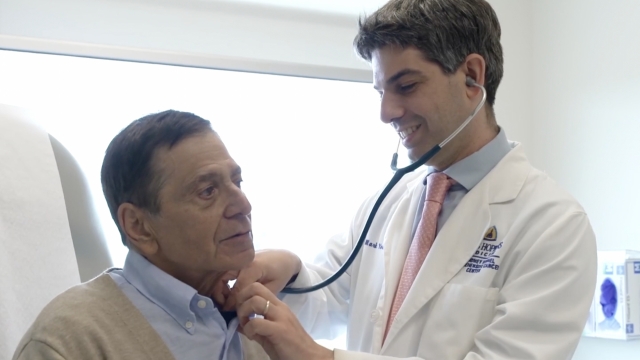In 2020, Jerry Fontana of Scranton, Pennsylvania, received horrible news: Doctors in Scranton diagnosed him with late-stage liver cancer.
“I was very, very sick. I couldn’t eat, I couldn’t sleep. I was in total pain all the time,” Fontana said. “They told me to get my life in order. I have maybe 3 to 6 months to live.”
That was four years ago.
Fontana went to Johns Hopkins’ in Baltimore and participated in an early-stage clinical trial led by Dr. Mark Yarchoan.
Researchers developed and tested a personalized vaccine aimed at shrinking tumors, used in combination with a type of immunotherapy for hepatocellular carcinoma, which is the most common form of liver cancer.
“This is a cancer that normally, in most cases arises out of a sick liver. So patients with cirrhosis from any cause such as hepatitis B, hepatitis C. Increasingly you see particularly in the United States, patients with alcohol or fatty liver disease,” said Yarchoan.
Fontana, along with 35 others were given an immunotherapy drug alongside the vaccine. Liver cancer is one of the leading causes of cancer deaths worldwide, accounting for over 700,000 deaths each year, according to the American Cancer Society. Liver cancer rates have more than tripled since 1980; the death rates have more than doubled during this time.
Now, researchers have developed a personalized vaccine to fight tumors in liver cancer patients and are running it in clinical trials. Vaccines work by super-charging our immune systems, so while we may think of them only for prevention of illnesses like the flu or COVID, they’re used in treatment too. The personalized anti-tumor vaccines are made of specific DNA to target mutated cancer genes. The DNA is derived from a patient’s own biopsy of their tumor. Roughly a third of the patients' tumors shrunk.
“Patients had continued tumor control for, in many cases, months or years,” said Yarchoan.
Fontana’s tumor did not shrink much — so he’s not counted in that 30%. But the cancer levels in his blood dropped, Yarchoan explains.
“We may be underestimating the total number of patients who benefited from the treatment when we give that sort of top-line number of around 30% of patients having tumor shrinkage, because clearly there are patients who’ve benefited beyond that number,” he said.
Fontana is now in a second trial for liver cancer patients at Johns Hopkins, and with a second lease on life — one he refuses to squander. He's active, and tells Scripps News he's happy to participate in medical research to pay it forward. He's back to work too.
“I’m fixing cars and I actually work. So I’m working three days a week, four hours a day. You know, just keep busy because I’m retired, you know? I got to live life. That’s tough to do when I want to go fishing,” said Fontana, with a smile.
SEE MORE: Study: Many cancer drugs remain unproven after accelerated approval
Trending stories at Scrippsnews.com




